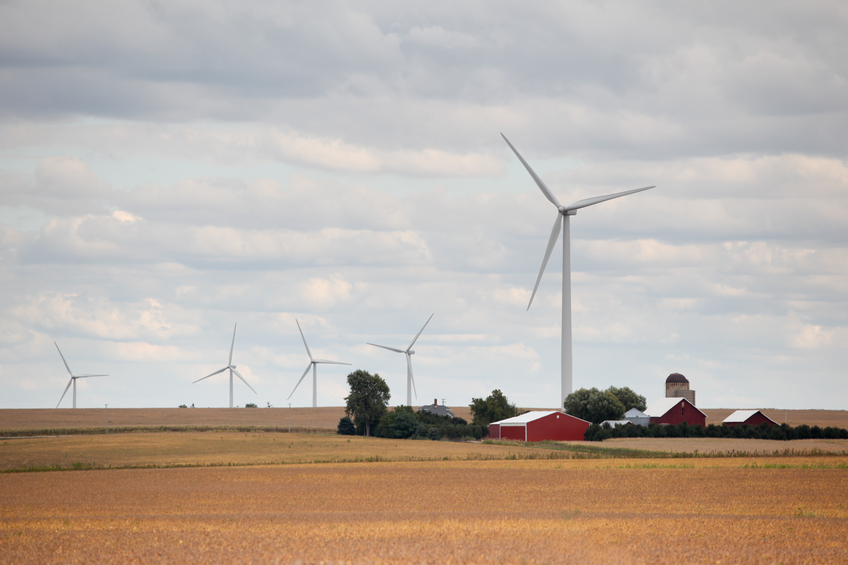The predominantly coal-powered Commonwealth of Kentucky currently has no operational utility-scale wind farms. The Department of Energy (DOE) reports on its Energy Efficiency and Renewable Energy Web site that "Kentucky does not have sufficient wind resources to use large-scale wind turbines." A wind resource map provided by the DOE's National Renewable Energy Laboratory, however, identifies Class 3 wind resources concentrated in eastern Kentucky along the Kentucky-Virginia border. A favorable state energy agenda and new state tax incentives for renewable energy facilities could help a recently founded Kentucky-based wind farm developer not only harness that wind resource for the commonwealth's first utility-scale wind farm, but also reclaim mountain areas stripped by coal mining.
   While Kentucky has not passed renewable portfolio standard legislation, the commonwealth publicly acknowledged in August its support for the 25x'25 Action Plan, which provides goals for advancing renewable energy industry in the U.S. The authority for this support comes by way of the Kentucky Rural Energy Consortium – an energy research and education organization established through a federal appropriation to the University of Louisville in collaboration with the University of Kentucky and the Governor's Office of Energy Policy.
   Much of Kentucky's focus on renewable resources has been in the area of coal conversion technologies. On Aug. 30, Gov. Ernie Fletcher signed House Bill (HB) 1, which includes the Incentives for Energy Independence Act. The provisions of the act set incentives for organizations that increase production and sales of "alternative transportation fuels�synthetic natural gas, chemicals, chemical feedstocks, or liquid fuels, from coal, biomass resources, or waste coal through a gasification process."
   At the bill signing, Fletcher said Kentucky has not realized the full potential of coal, which, according to the governor's energy office, provides more than 90% of the state's electricity needs.
   "Through history, all we've done with coal is burn it," Fletcher added. "Now we know coal can be converted into alternative fuels, including liquid fuels and synthetic natural gas."
   The act, however, also allows incentives for generators of electricity from renewable resources – a provision that could benefit the goals of start-up wind farm developer Genesis Development of Kentucky LLC.
   "We are hoping that we can capitalize on the wording of the bill in relation to renewable energy," says Scott Sykes, president of Genesis Development. "Hopefully, we will be able to move forward with project development and tie it to the bill."
   Provisions of the act include:
   – advanced disbursement of post-construction incentives,
   – sales and tax incentives of up to 100% of the taxes paid on property used to construct or upgrade an eligible facility,
   – up to 100% of the Kentucky income tax and limited liability entity tax on income and gross profits and receipts, and
   – wage assessments of up to 4% of the gross wages for each employee whose job was created as a result of the eligible facility. In addition, the act establishes that the maximum recovery from all incentives cannot exceed 50% of the capital investment in the eligible facility.
   Genesis Development announced in February that it would conduct site testing in Kentucky for potential wind farms.
   "We would like to have 100 MW [of wind power] online within three to five years," says Sykes. "That's including doing wind assessments, environmental assessments and permitting."
   On the same day Fletcher signed HB 1, Sykes met with representatives of the governor's energy office to secure $125,000 in funding through an energy commercialization grant. The grant, which Sykes says is not associated with HB 1, will be for preliminary site evaluations of locations that have pre-existing mountaintop removal projects from coal mining. Coal is extracted from surface mines in western Kentucky and mountaintop mines in eastern Kentucky.
   "Instead of cutting timber and preparing a place where you can look across the ridge and see where a mountaintop removal project occurred," he says, "we want to put a renewable source of energy in a place where carbon energy and fossil fuels were once extracted."
   Site evaluations under the grant must be completed by next summer, and Sykes says Genesis Development is negotiating with landowners in order to begin wind resource assessments by January 2008. Genesis Development plans to partner with large power companies to reach the company's first 100 MW goal and enter into power purchase agreements for the electrical output from that capacity. Despite the position of coal as an energy resource in Kentucky, Sykes is optimistic about finding the support his company will need to build a wind farm there.
   "We're not one to challenge coal," says Sykes. "We're one to be an ally of coal."
© Copyright Zackin Publications Inc. All Rights Reserved.



